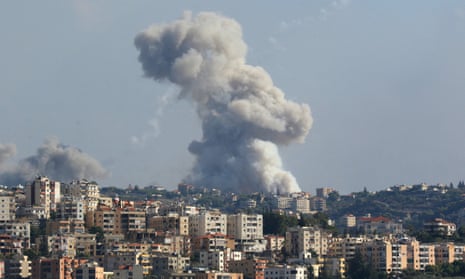As dawn broke over the Lebanon-Israel border on Monday, September 23, 2024, the skies erupted with the thunderous roar of Israeli warplanes. In what military officials are calling the most intense bombardment since the outbreak of the Gaza war last October, Israel has unleashed a barrage of strikes against Hezbollah targets across southern and eastern Lebanon. The dramatic escalation has sent shockwaves through the region, raising fears of a potential wider conflict and prompting urgent calls for restraint from the international community.
According to Israeli military spokesman Rear Admiral Daniel Hagari, more than 300 Hezbollah sites were targeted on Monday alone in dozens of precision strikes. The scale and intensity of the operation mark a significant departure from the tit-for-tat exchanges that have characterized the cross-border conflict over the past year.
“We will engage in extensive and precise strikes against terror targets which have been embedded widely throughout Lebanon,” Hagari declared in a rare direct address to Lebanese civilians. His unprecedented appeal urged people to “immediately move out of harm’s way for their own safety,” signaling that the strikes are set to continue “for the near future.
The impact of Israel’s offensive was felt across a wide swath of Lebanese territory. The National News Agency reported “more than 80 air strikes in half an hour” targeting south Lebanon, while “intense raids” pummeled the Bekaa Valley to the east. The strikes have already claimed lives, with the Lebanese health ministry reporting at least one civilian casualty – a shepherd killed in the Bekaa Valley.
Wafaa Ismail, a 60-year-old housewife from the south Lebanon village of Zawtar, painted a grim picture of life under constant threat. “We sleep and wake up to bombardment,” she said, her voice heavy with fatigue. “That’s what our life has become.”
Hezbollah, the powerful political and military force in Lebanon, has not remained silent in the face of Israeli aggression. The group’s deputy chief, Naim Qassem, declared that Hezbollah was entering a “new phase, namely an open reckoning” with Israel, and stood ready for “all military possibilities.”
This defiant stance comes in the wake of recent blows to Hezbollah’s leadership. An Israeli airstrike in southern Beirut on Friday claimed the life of Ibrahim Aqil, commander of Hezbollah’s elite Radwan Force, along with 44 others. The strike followed coordinated attacks on Hezbollah’s communications infrastructure earlier in the week, which killed 39 people and wounded nearly 3,000.
As the conflict intensifies, world powers are scrambling to prevent a full-scale war. United Nations Secretary-General Antonio Guterres warned of the risk of Lebanon becoming “another Gaza” and noted that “both sides are not interested in a ceasefire” at present.
U.S. President Joe Biden, whose country is Israel’s leading arms supplier, pledged that his administration would “do everything we can to keep a wider war from breaking out.” Meanwhile, Russia expressed “extreme concern” at the threat of escalation, and China urged its nationals to leave Israel.
As political tensions rise, it’s the civilians on both sides of the border who bear the brunt of the conflict. In Israel, rocket attacks from Hezbollah have forced residents in northern areas, including the major city of Haifa, to seek shelter. The attacks have caused damage and disrupted daily life, with Israeli Prime Minister Benjamin Netanyahu asserting that “no country can tolerate attacks on its citizens.
In Lebanon, the impact has been even more severe. The health ministry reported 34 wounded and instructed hospitals in the south and east to halt non-urgent surgeries to make room for potential casualties. Schools in affected areas, including Beirut’s southern suburbs, have been closed for two days as a precautionary measure.
The escalation between Israel and Hezbollah comes against the backdrop of the ongoing conflict in Gaza, which has claimed over 41,000 Palestinian lives according to local health authorities. The interconnected nature of these conflicts has raised concerns about a potential regional conflagration.
Egyptian Foreign Minister Badr Abdelatty highlighted this connection, telling AFP that the Israel-Hezbollah flare-up “negatively affects” Gaza ceasefire efforts, citing a “lack of political will on the Israeli side.
As night falls on the Lebanon-Israel border, the region holds its collective breath. The intensification of strikes against Hezbollah marks a dangerous new chapter in the long-standing conflict, with the potential to draw in other regional players and destabilize an already fragile Middle East.
The coming days will be crucial in determining whether diplomacy can prevail over escalation. As world leaders call for restraint and civilians on both sides of the border brace for further violence, the international community watches with growing concern. The stark warning from Israeli officials to Lebanese civilians underscores the gravity of the situation and the potential for further humanitarian crises in a region already scarred by decades of conflict.
For now, the residents of southern Lebanon and northern Israel can only hope that cooler heads will prevail, even as the skies above them continue to rumble with the sound of war.




